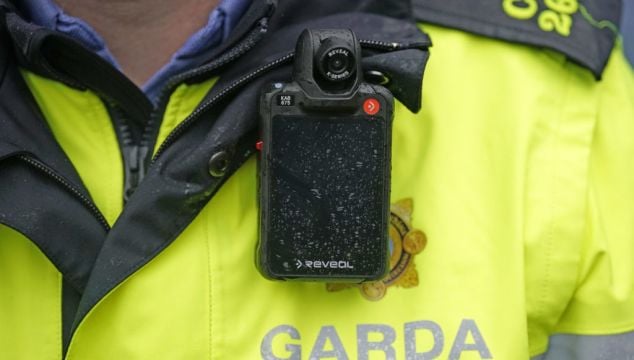Garda body worn cameras are set to be rolled out in Limerick after they were successfully launched in Dublin.
Minister for JusticeHelen McEntee and Garda Commissioner Drew Harris launched the Body Worn Cameras proof of concept at Henry Street Garda station in Limerick city.
Limerick is the second of three pilot locations to test the use of Garda Body Worn Cameras (BWCs) before a national rollout. The first trial commenced in Dublin in early June.
Ms McEntee said: “Ensuring that frontline gardaí are equipped with Body Worn Cameras has been a priority for me and I am very pleased we are now extending the pilot phase to Limerick.
“This initiative will vastly improve how we police our streets. Our gardaí regularly respond to tense situations and too often find themselves being recorded while trying to do their jobs. We cannot keep sending gardaí into those situations without them having the ability to record what is happening. Body Worn Cameras will offer protection both to gardaí and to the public with accurate recording of incidents.
“I’m pleased that this technology will now be used and tested by frontline gardaí here in Limerick. Today marks another important step towards ensuring every Garda has access to this technology. Early feedback on the use of Body Worn Cameras in Dublin has been positive from gardaí, members of the public and the retail business community.”
The Garda Síochána (Recording Devices) Act 2023 was signed into law last December. The Act provides for Body Worn Cameras, Garda CCTV, automatic number plate recognition, and community CCTV.
An Garda Síochána is undertaking three phased introductions as part of its proof of concepts stage. Three vendors have been chosen with different BWCs to be deployed in each trial location. The cameras in use in the DMR and Limerick are from different manufacturers.
The pilot roll-out of BWCs will continue later this year in Waterford. When complete, the three-phased pilot will inform their introduction in Garda stations nationwide.
Each BWC can record footage to its own internal encrypted storage, which will be uploaded when the Garda docks the camera in a Garda station. The camera footage is uploaded at the end of a shift so it can be used as evidence at court or is deleted after an agreed time if it is not required as evidence.
Ms McEntee added: “The Government is absolutely committed to ensuring An Garda Síochána have the technology and equipment required to keep our communities safe. Introducing Garda Body Worn Cameras is a vital part of that commitment to keep people safe because it will help gardaí prevent, investigate, and prosecute criminal offences along with threats to public safety and public order.
“Attacks on our gardaí, or attempts to intimidate them, are completely unacceptable and Body Worn Cameras will be key to ensuring they are protected as they carry out their duties.
“I look forward to hearing about the progress and learnings of the pilots in Limerick and Dublin and look forward to the commencement of the Waterford pilot in the near future.”







